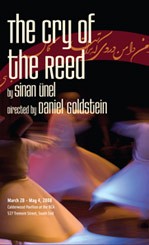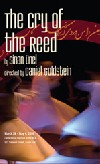Calderwood's The Cry of the Reed Premieres
Contrasts Sufi Humanitarism to Islamic Extremism
By: Mark Favermann - May 04, 2008
The Cry of the Reed
Written by Sinan Ãœnel
Directed by Daniel Goldstein
Wimberly Theatre
At The Stanford Calderwood Pavilion
527 Tremont Street in Boston's South End
A Program of The Huntington Theatre Company
3/28/2008-5/3/2008
- The Cast
- Amir Arison (Hakan/Kadir)
- Lisa Birnbaum (Sevgi)
- Sean Dugan (Josh)
- Laith Nakli (Tariq/Emir/Mumtaz)
- CIgdem Onat (Ayla)
- Darren Pettie (Philip)
- Rafi Silver (Nabil)
- The Creative Crew
- Eugene Lee (Sets)
- Laurie Churba (Costumes)
- Michael Chybowski (Lighting)
- Eric Shim (Sound and Music Composition).
Artistic ambition is often a two edged sword. It can cut creatively and sometimes also rip unsubtly. This is the dilemma for the recent world premiere at the Huntington Theatre's Calderwood Pavilion, The Cry of the Reed, by award-winning playwright, Sinan Unel. The play has some wonderful and provocative content performed by an excellent group of actors. But, the message is often obscured by the density of tragic story lines and personal conflict. There is too much trying to be said intensely that, though often very troubling and at times poignant, the play does not seem to make clear or distinctive points. The dramatist wants to include every issue he can into the play. Making a drama about current troubling affairs is not easy.
The story begins with an Turkish-American journalist and her Canadian colleague who almost immediately find themselves unexpectedly kidnapped by a band of Iraqi insurgents. American bombs rain down on a war-torn brutal landscape. Before she is to die, her Suni captors offer her one telephone call. This is a chance to reconnect with the mother who she hasn't spoken to in 10 years that is now living in Turkey. Her mother is a religious teacher, even a prophet preparing for a festival celebrating the great Sufi poet Rumi. The drama plays out through the family and tribal connections. It ends with the spinning of whirling dervishes. This is an intense ripped-from-the-headlines portrait of a world at war.
Playwright Sinan Unel's earlier plays have been produced in New York, Boston, New Haven, Los Angeles, London, Germany, and Austria. A Huntington Playwriting Fellow, he is also the winner of the John Gassner Memorial Award, the Daryl Roth Creative Spirit Award, and the Lark Theater's New Play Award. His other plays include Pera Palas, Tolstoy's Den, Thalassa My Heart, and The Three of Cups.
Apparently, Ãœnel was inspired to work on this piece in 2004 by something that he read in The New York Times. "I'd been thinking about writing a historical play about the Sufi Mystic Philosopher/Poet Rumi's life when I ran into an article about a young Turkish journalist who'd been abducted in Iraq with a Canadian colleague," he says. "In the play, the two stories evolve at the same time. By putting them on stage together, there is an interaction between these two aspects of a religion. How it is in some ways essential, and in other ways so destructive."
I really don't want to say that this play was cliché-ridden. However, the author seemed to include everything but the kitchen sink.
Most of the dramatic action was quite expected, not a bit surprising. In recent years, we have been barraged with painful war imagery, human and property devestation, terrorists, hostages and unending reports of suicide bombings and warring Islamic factions. Apparently, in Sinan Ãœnel's newest work, The Cry of the Reed, the playwright in a less than subtle way, tried to offer a different perspective on the Middle East morass. He did this by pairing two stories. One plot line follows the conflicted female journalist and her colleague in Iraq; and the other, follows the journalist's equally conflicted mother in Turkey. The philosophy of Rumi, a humanitarian aspect of Islam about tolerance, is what the mother adheres to. She came to it belatedly after being a radical in her youth.
Playwright Ãœnel trys to make the point in the play that there are two aspects of any religion: the very personal, private aspect about love, tolerance and acceptance, and what happens when it becomes militant, both socially and politically involving violence and intolerance. This is wrapped in very human family and cultural dynamics. This is very tough to pull off in a dramatic setting surrounded by our 24 hour news environment and media-heavy contemporary world. Personalization of the two aspects of religion is very hard to do with aplomb and veracity. He gets an "A" for effort, however, even if the content is not on the same passionate level. Kudos to the Huntington for their support of this attempt to push the envelope.
An outstanding, even star turn, was given by internationally acclaimed Turkish actress, Cigdem Onat. Her Ayala performance is rich and emotionally vibrant. Lisa Birnbam's Sevgi was quite good as well. Though, Rafi Silver's Nabil was the stock jester/thief of a type in many Sinbad productions. He seemed to eat the worn, eroded scenery everytime he appeared. Sean Dugan's Josh was believable if not very true in some of his lines. Darren Pettie's Philip performance was solid even if his role seemed like a very contrived character-the abandoned boyfriend musician that has all of his possesions stolen in Turkey before he attempts to save his girlfriend. The rest of the actors were all very good.
Eugene Lee's worn down, eroding sets were spare and evocative, while the music by Eric Shim was moody and at times a bit cacophanous. The stage direction seemed quite elegant and well choreographed. Actors from different places passed each other literally and symbolically.
Looking in the mirror is not always pleasant. We often tend to see our flaws quite exaggerated. The Cry of the Reed is a bit like this. We don't always like what we see, but we are strongly drawn to look.


